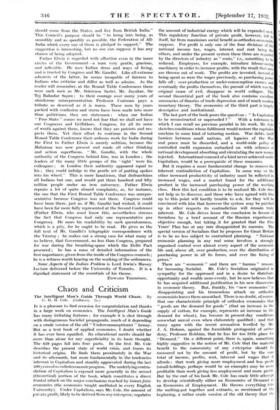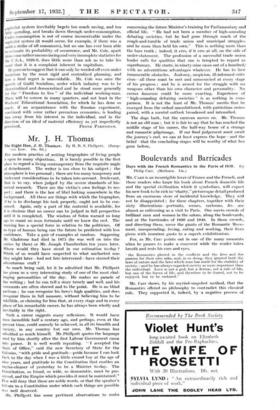Chaos and Criticism The Intelligent Man's Guide Through World Chaos.
By IT is a pleasure to find occasion for congratulation and thanks in a large work on economics. The Intelligent Mares Guide has many irritating features ; for example it is shot through with disingenuous Socialist propaganda, much of it depending . on a crude version of the old " Underconsumptionist " heresy. But as a text book of applied economics, I doubt whether it has ever been equalled. . Its educational merits should far .more than atone for any superficiality in its basic thought. The 659 pages fall into four parts. In the first Mr. Cole . describes the present state of -world crisis, and_ traces its :historical origins. He finds them proximately in the War -and its aftermath, but more fundamentally in the tendencies :inherent in Capitalism and .steadily aggravated during the last 200 years of so-called economic progress. The underlying contra- : diction of Capitalism is exposed more generally in the second . (theoretical) portion of the book, which constitutes a direct frontal attack on the major conclusions reached by laissez faire economics (the economics taught undiluted in every English University). Under Capitalism, says Mr. Cole, the amount of private pr011t, likely to be derived from any enterprise, regulates the amount of industrial energy which will be expended on it This regulatory function of private profit, however, left to itself, far from maximises social benefit as orthodox economisti suppose. For profit is only one of the four divisions of the national income tax, wages, interest and . rent being th, others, and under the present system these three are regarded by the directors of industry as " costs," i.e., something to be reduced. Employers, for example, introduce labour-saving machinery in order to increase profits, with the result that men are thrown out of work. The profits are invested, instead of being spent as were the wages previously, so purchasing power falls off ; over-production or under-consumption ensues, and eventually the profits themselves, the pursuit of which was the original cause of evil, disappear in world collapse. This second theoretical part of the book also contains excellent summaries of theories of trade depression and'of much modern monetary theory. The economics of the third part is largely descriptive and institutional.
The last part of the book poses the question : " Is Capitalism to be reconstructed or superseded ? " With a tolerance to which I can recall no previous parallel in his work, Mr. Cole sketches conditions whose fulfilment would restore the capitalist machine to some kind of tottering motion. War debts, tariff barriers between small nations, all legacies of the War and peace must be discarded, and a world-wide policy of controlled credit expansion embarked on with schemes of national development absorbing and circulating the new money injected. International concord of a kind never achieved under Capitalism, would be a prerequisite of these measures.
But it requires a more fundamental change to remove the inherent contradiction of Capitalism. In some way or the other increased productivity of industry must be reflected in increased wages, and a market found for the additional product in the increased purchasing power of the working class. How this last condition is to be realized Mr. Cole does not help us to discover, and those who have agreed with him up to this point will hardly trouble to ask, for they will be convinced with him that however the system may be patched up in other respects its contradiction will remain truly inherent. Mr. Cole drives home the conclusion in favour of Socialism by a brief account of the Russian experiment: objective enough, but taking _ it for granted that the Five Years' Plan has at any rate disappointed its enemies. The special version of Socialism that he proposes for Great Britain is to be no less subject to centralized planning. " National economic planning in any real sense involves a strongly organized control over almost every aspect of the economic life and, above all, over production, over the distribution of purchasing power in all its forms, and over the fixing of prices."
There are " economic " and there are " human " reasons for becoming Socialist. Mr. Cole's Socialism originated in sympathy for the oppressed and in a desire to distribute opportunity and wealth more evenly, but he now believes that he has acquired additional justification in his new discoveries in economic theory. But, frankly, his "new economics" is disappointing and his tremendous attack on orthodox economists leaves them unscathed. There is no doubt, of course, that one characteristic principle of orthodox economics that " goods are the demand for goods " (that an increase in the supply of cotton, for example, represents an increase in the demand for wheat), has become in present-day conditions somewhat unreal even when elaborately qualified ; and that many agree with the recent accusation levelled by Mr. J. A. Hobson, against the formidable protagonist of ortho- doxy, Professor Robbins, that he has far too little place for "Demand." On a different point, there is, again, something highly suggestive in the notion of Mr. Cole that the material benefit to the community of any e nterprise should be measured not by the amount of profit, but by the suns total of income, profits, rent, interest and wages that it affords ; that work giving more employment and less profit (small-holdings, perhaps would be an example) may be more profitable than work giving less employment and more profit. But by the end- of his book Mr. Cole has made little attempt to develop scientifically either an Economics of Demand or an Economics of Employment. He throws everything into the melting-pot together and extracts, as mentioned at the beginning, a rather crude version of the old theory that the capitalist system inevitably begets too much saving, and too little spending, and breaks down through under-consumption. Ender-consumption is not of course inconceivable under the capitalist system (it would occur, for example, if there was a sudden strike of all consumers), but no one has ever been able to estimate its probability of occurrence, and Mr. Cole, apart from some rather unconvincing and very incomplete statistics for the t'.S.A., 1926-9, does little more than ask us to take his word that it is a complaint inherent in capitalism.
He goes on to suggest that it can only be warded off even under Socialism by the most rigid and centralized planning, and here a final regret is unavoidable. Mr. Cole was once the apostle of Guild Socialism, under which industry was to be decentralized and democratized and he stood more generally for the " Freedom to live " of the individual working-man. There will be sorrow in many quarters, and not least in the Workers' Educational -Association, for which he has done so much, if an acquaintance with the Russian experiment, combined with some rather precarious economics, is leading him away from his interest in the individual, and in the direction of an ideal of material efficiency as yet imperfectly































 Previous page
Previous page